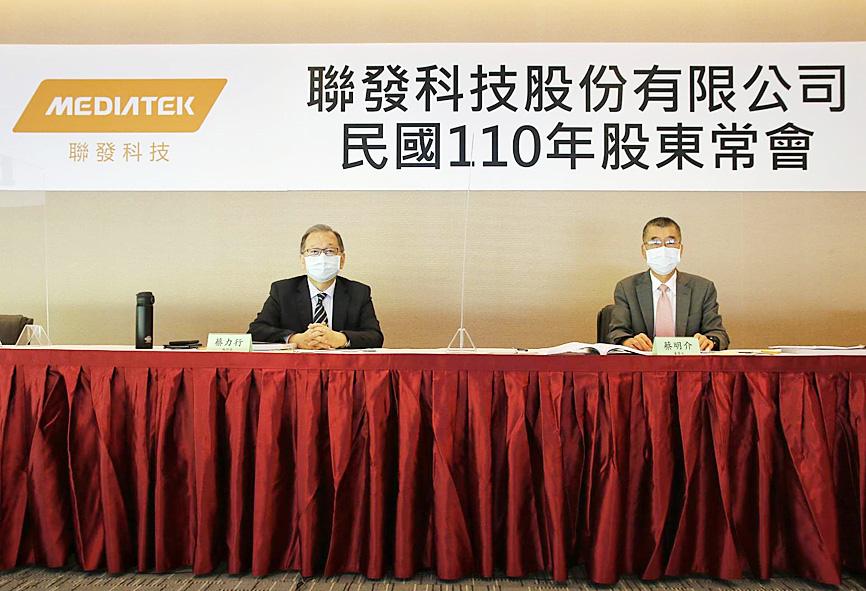MediaTek Inc (聯發科), the world’s top 5G smartphone chip supplier, yesterday retained its upbeat forecast for this year and next year due to 5G’s rising uptake, shrugging off a brief disruption to production linked to COVID-19 infections at its local chip testing and packaging partner.
MediaTek’s remarks came after a shareholder at the company’s annual general meeting voiced concern about a ripple effect caused by the infections at King Yuan Electronics Co (KYEC, 京元電子).
KYEC halted production at its factories in Miaoli County for two weeks last month and lowered utilization for the remainder of the month to stamp out an outbreak at its factory in Jhunan Township (竹南).

Photo courtesy of MediaTek Inc
“Based on our management team’s evaluation, the impact should be short-term. [We] expect a gradual recovery from the third quarter,” MediaTek chairman Tsai Ming-kai (蔡明介) said.
Responding to another shareholder’s concerns about a lukewarm recovery in China’s smartphone market, Tsai said MediaTek did not expect weakness in any market, or its consumer electronics segment to impair its business significantly, given its diverse product portfolios.
“We still have a positive business outlook for this year and next year as the company sees growth from smartphones, TVs, tablets, Wi-Fi and ASIC [application-specific ICs],” Tsai said.
Revenue would expand more than 40 percent this year, from NT$322.1 billion (US$11.54 billion) last year, as projected in April, due mainly to the increasing uptake of 5G smartphones, MediaTek chief executive officer Rick Tsai (蔡力行) said.
Gross margin would improve to between 44 and 46 percent this year, he added.
As the world ushers in the 5G era, the uptake of 5G-enabled devices, including smartphones, is gaining momentum, with China having the fastest uptake, Tsai Ming-kai said.
Demand would pick up gradually after the US and European economies reopen as the COVID-19 situation eases, he said.
MediaTek forecast that the global 5G smartphone market would reach 500 million units this year with China contributing 300 million units.
Aside from 5G smartphones, MediaTek also reported growth from customers’ market share gains in the 4G phone segment in emerging markets from Southeast Asia and India to Africa, Tsai Ming-kai said.
Shareholders yesterday approved a planned cash dividend distribution of NT$21 per common share, representing a payout ratio of 80.73 percent based on the company’s earnings per share of NT$26.01 last year.
Shareholders also approved a plan to pay a cash dividend of NT$16 per common share each year over the next four years.
KYEC yesterday reported that its revenue dropped 30.77 percent to NT$1.98 billion last month from NT$2.86 billion in May, closely matching the firms’ estimate due to temporary factory shutdowns.
KYEC reported NT$7.6 billion in revenue for last quarter, little changed from NT$7.63 billion in the first quarter.

Taiwan Semiconductor Manufacturing Co (TSMC, 台積電), the world’s biggest contract chipmaker, booked its first-ever profit from its Arizona subsidiary in the first half of this year, four years after operations began, a company financial statement showed. Wholly owned by TSMC, the Arizona unit contributed NT$4.52 billion (US$150.1 million) in net profit, compared with a loss of NT$4.34 billion a year earlier, the statement showed. The company attributed the turnaround to strong market demand and high factory utilization. The Arizona unit counts Apple Inc, Nvidia Corp and Advanced Micro Devices Inc among its major customers. The firm’s first fab in Arizona began high-volume production

VOTE OF CONFIDENCE: The Japanese company is adding Intel to an investment portfolio that includes artificial intelligence linchpins Nvidia Corp and TSMC Softbank Group Corp agreed to buy US$2 billion of Intel Corp stock, a surprise deal to shore up a struggling US name while boosting its own chip ambitions. The Japanese company, which is adding Intel to an investment portfolio that includes artificial intelligence (AI) linchpins Nvidia Corp and Taiwan Semiconductor Manufacturing Co (TSMC, 台積電), is to pay US$23 a share — a small discount to Intel’s last close. Shares of the US chipmaker, which would issue new stock to Softbank, surged more than 5 percent in after-hours trading. Softbank’s stock fell as much as 5.4 percent on Tuesday in Tokyo, its

COLLABORATION: Softbank would supply manufacturing gear to the factory, and a joint venture would make AI data center equipment, Young Liu said Hon Hai Precision Industry Co (鴻海精密) would operate a US factory owned by Softbank Group Corp, setting up what is in the running to be the first manufacturing site in the Japanese company’s US$500 billion Stargate venture with OpenAI and Oracle Corp. Softbank is acquiring Hon Hai’s electric-vehicle plant in Ohio, but the Taiwanese company would continue to run the complex after turning it into an artificial intelligence (AI) server production plant, Hon Hai chairman Young Liu (劉揚偉) said yesterday. Softbank would supply manufacturing gear to the factory, and a joint venture between the two companies would make AI data

DOLLAR SIGNS: The central bank rejected claims that the NT dollar had appreciated 10 percentage points more than the yen or the won against the greenback The New Taiwan dollar yesterday fell for a sixth day to its weakest level in three months, driven by equity-related outflows and reactions to an economics official’s exchange rate remarks. The NT dollar slid NT$0.197, or 0.65 percent, to close at NT$30.505 per US dollar, central bank data showed. The local currency has depreciated 1.97 percent so far this month, ranking as the weakest performer among Asian currencies. Dealers attributed the retreat to foreign investors wiring capital gains and dividends abroad after taking profit in local shares. They also pointed to reports that Washington might consider taking equity stakes in chipmakers, including Taiwan Semiconductor